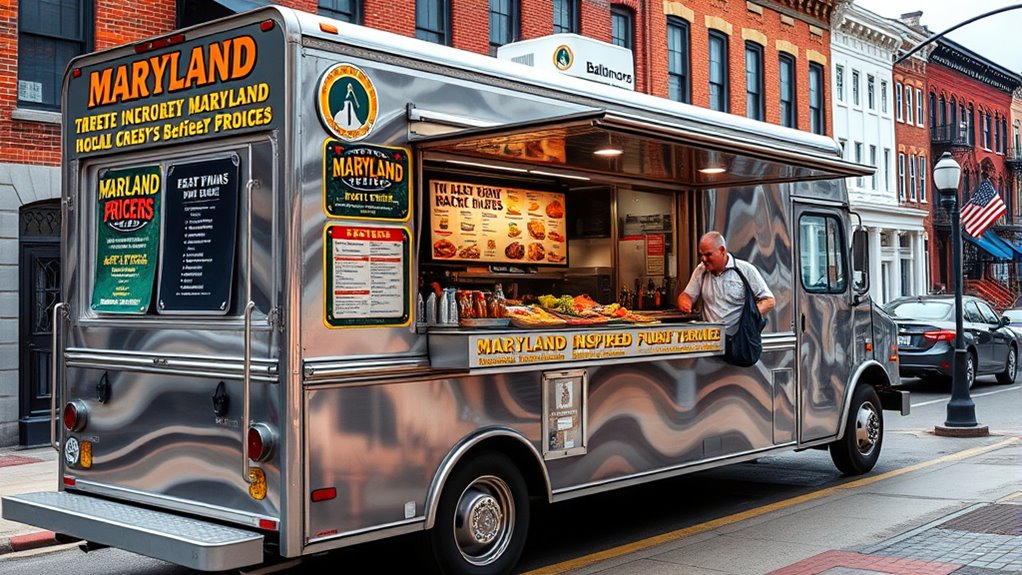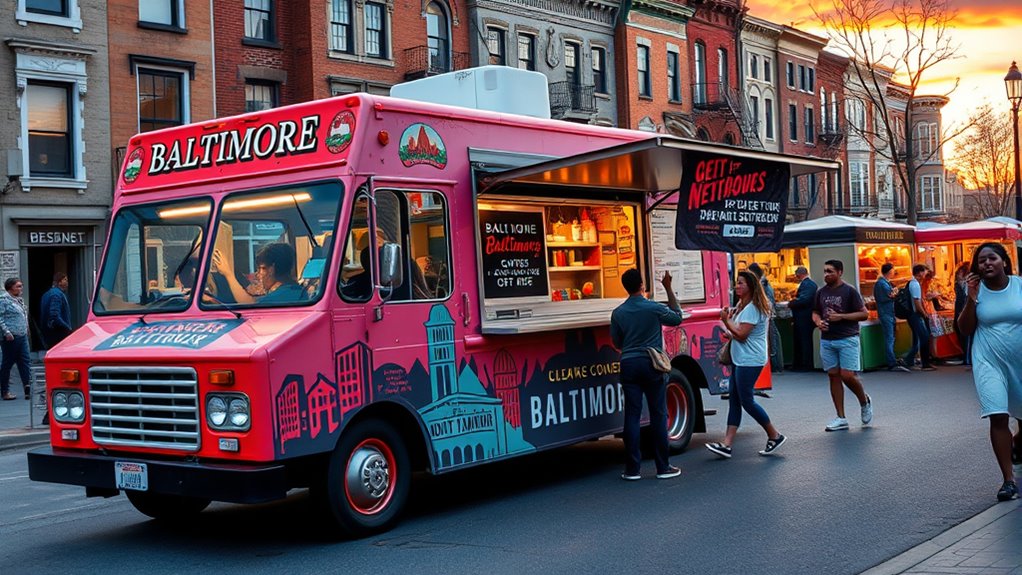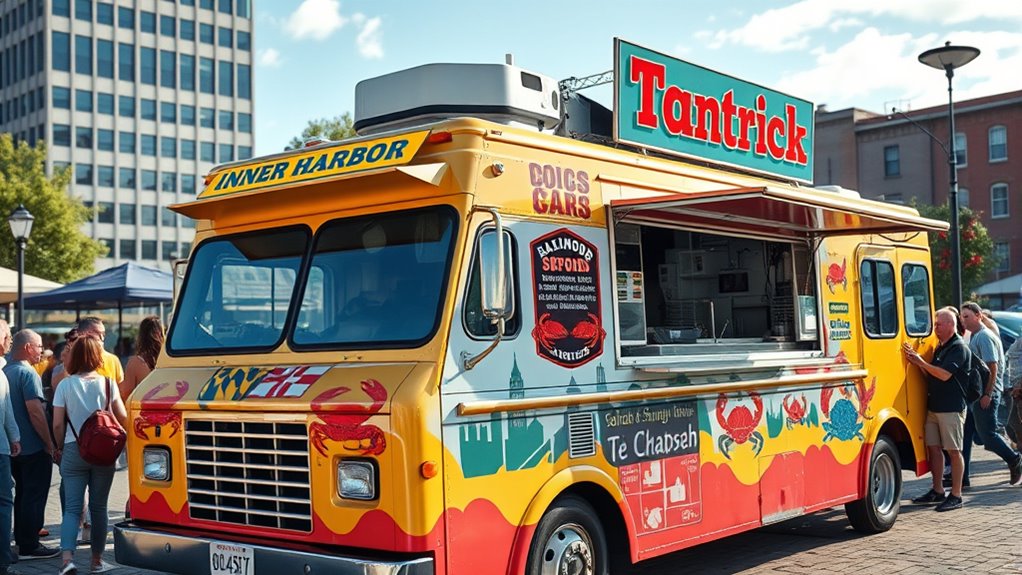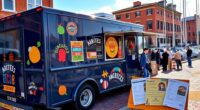To open a food truck in Baltimore, you’ll need to secure permits like a Mobile Food Service Facility Permit, vendor licenses, and insurance, costing around $100–$375 annually. Plan for startup costs of $50,000–$250,000 for your truck, equipment, and permits. Choose high-traffic locations like downtown Baltimore or event venues, and craft a menu featuring local favorites. Effective marketing via social media and community partnerships can boost your success. Keep reading to learn how to turn these steps into a thriving, profitable business.
Key Takeaways
- Obtain necessary permits including Baltimore City Mobile Vendor License (~$75-$375) and health department approvals for legal operation.
- Startup costs range from $50,000 to $250,000, covering truck purchase, outfitting, permits, insurance, and initial inventory.
- Focus on high-traffic locations like Inner Harbor, Downtown, Penn Station, and partner with private properties for steady spots.
- Craft a menu featuring Maryland-inspired comfort foods, diverse options, and seasonal items to attract local customers.
- Use social media and platforms like StreetFoodFinder to promote locations, engage customers, and maximize visibility.
Navigating Permits and Legal Requirements in Baltimore

Navigating permits and legal requirements in Baltimore can seem complex, but understanding the process is crucial for your food truck’s success. You’ll need to go through a plans review to confirm health and safety standards are met, which involves submitting documents and scheduling inspections. Applying for a Mobile Food Service Facility Permit through the local health department is necessary, and you must declare your commissary or food depot. An annual Food Truck License, costing around $100 in Baltimore County, restricts parking near restaurants. In Baltimore City, a Mobile Vendor License ranges from $75 to $375 depending on location. You’ll also need various vendor permits, like street vendor or farmers’ market licenses, each with specific requirements and restrictions. Be prepared for application fees, renewal deadlines, and compliance with zoning laws to operate legally. Additionally, understanding the legal requirements for online and physical operation can help streamline your startup process and ensure compliance.
Estimating Startup and Operational Expenses
Estimating your startup and operational expenses helps you understand the financial commitment needed to launch and run your Baltimore food truck. Initial costs typically range from $50,000 to $250,000, covering truck purchase or rental, outfitting, permits, licenses, insurance, and initial inventory. Truck costs vary from $30,000 to over $100,000, depending on new or used options and customizations. You should also budget for marketing, branding, menu development, and a financial cushion for unforeseen repairs or delays. Ongoing expenses include inventory, staff wages, fuel, utilities, and maintenance, totaling $5,000 to $10,000 monthly. Higher Baltimore costs—like insurance premiums, parking fees, and specialty ingredients—can increase your expenses. Managing these costs with simplified menus and smart technology boosts profitability and sustainability. Additionally, understanding the importance of proper financial planning and regular expense review can help you maintain profitability and adapt to market changes.
Choosing Prime Locations for Your Food Truck
To attract steady crowds, you need to pick high-traffic public areas like busy downtown streets, university campuses, or event venues. Private property partnerships, such as breweries or markets, can also offer reliable spots with less competition. Carefully assess each location’s accessibility, permits, and foot traffic to maximize your food truck’s visibility and sales. Additionally, utilizing a platform like StreetFoodFinder can help you identify the best nearby locations with high potential for customer flow. StreetFoodFinder provides real-time updates on popular food truck spots to ensure you choose optimal sites. Incorporating industry insights can further enhance your location strategy by keeping you informed about emerging trends and high-demand areas.
High-Traffic Public Areas
Finding the right location is essential for your food truck’s success, especially in Baltimore’s bustling areas. High-traffic public zones offer prime opportunities to attract customers. Consider these key spots:
- Downtown Baltimore, especially the Inner Harbor, with its steady flow of tourists and locals.
- Near landmarks like the National Aquarium or Camden Yards during events, drawing large crowds.
- Busy shopping districts on Charles Street and transit hubs like Baltimore Penn Station for consistent foot and vehicle traffic.
These areas combine foot traffic, vehicle congestion, and event-driven crowds, maximizing exposure. Be mindful of safety and traffic regulations, especially on heavily congested streets like Pratt and Light Street. Choosing the right high-traffic zone can considerably boost your sales and visibility. High traffic volumes increase collision likelihood, so ensure your operations prioritize safety to avoid accidents and disruptions. Additionally, understanding traffic flow patterns can help you select optimal times for operation and reduce congestion-related delays.
Private Property Opportunities
Choosing the right private property for your food truck can considerably boost your sales and visibility in Baltimore. Parking lots at liquor stores or retail outlets offer large, accessible spaces that are often underused on weekends, providing prime spots for customer traffic. Church and community center parking areas can offer periodic opportunities during weekend events or local gatherings. Near office parks and business centers, private commercial parking lots can generate steady weekday lunchtime sales. Food parks and shared vendor locations created by private owners give you dedicated space alongside other trucks, with added amenities. Occasionally, private event venues or outdoor markets rent space during festivals, expanding your reach beyond regular days. Researching these locations carefully, considering costs, permits, and safety, can maximize your truck’s success in Baltimore.
Crafting a Menu That Delights Local Tastes

Crafting a menu that delights Baltimore’s local tastes involves understanding the city’s diverse culinary preferences and incorporating them creatively. To stand out, focus on these key strategies:
- Embrace regional favorites like stacked cheesesteaks and lobster rolls, offering hearty, Maryland-inspired comfort foods. Food trucks in Baltimore often feature these local classics, appealing to residents’ love for familiar flavors.
- Incorporate diverse options such as jerk chicken with plantains or vegan sushi to appeal to Baltimore’s multicultural palate.
- Elevate classic American fast food with gourmet twists, like upscale hot dogs with artisanal toppings, satisfying the craving for familiar yet refined dishes.
- Incorporate local ingredients to boost freshness and support Maryland’s economy, which can also appeal to health-conscious consumers.
Use fresh, locally sourced ingredients to align with health-conscious trends. Rotate specials based on seasonal ingredients and culinary trends to keep your menu exciting and relevant.
Effective Marketing and Promotion Strategies

Effective marketing and promotion are essential to making your Baltimore food truck stand out amid the city’s vibrant culinary scene. Participating in local events, festivals, and farmers’ markets helps you showcase your food to diverse crowds and build brand recognition. Regular attendance fosters customer loyalty and encourages word-of-mouth promotion. Collaborating with local businesses like coffee shops and breweries expands your reach through joint promotions and social media content. Guerrilla marketing tactics, such as eye-catching posters in high-traffic neighborhoods like Federal Hill and Canton, boost visibility with minimal cost. Leveraging food truck parks and strategic locations increases foot traffic and exposure. Additionally, creating limited-time offers and exclusive promotions generates excitement and urgency, helping attract new customers and drive sales. Consistent branding across all marketing channels also plays a vital role in establishing a memorable presence and ensuring your audience easily recognizes your truck. Incorporating local partnerships into your marketing strategy can further strengthen community ties and enhance your visibility.
Budgeting and Financial Planning for Success
A solid budgeting and financial plan are essential for turning your Baltimore food truck into a sustainable business. To do this, focus on three key areas:
- Initial Investment: Expect startup costs between $50,000 and $100,000 for a new truck, or lower if purchasing used. Budget $2,000–$3,000 for inventory and $300 for serveware. Don’t forget permits (~$100/year) and insurance, which can run $500–$1,000 monthly. Properly maintaining equipment, such as your bicycle tire and other vehicle components, can help reduce repair costs over time.
- Operating Expenses: Account for food replenishment, fuel, maintenance, permit renewals, and labor costs. Include potential costs for commissary rentals or parking fees.
- Revenue & Contingency: Project sales based on location and menu. Maintain an emergency fund of 10–20% of startup costs for unforeseen expenses. Regularly track cash flow to stay profitable.
Frequently Asked Questions
How Long Does the Permit Approval Process Typically Take in Baltimore?
You’re wondering how long the permit approval process takes in Baltimore. Typically, it ranges from 2 to 4 weeks for standard permits, but complex cases may extend to 6-8 weeks due to multiple inspections and reviews. To avoid delays, submit a complete application early, ideally two months before you plan to start operating. Keep in mind, expedited options might be available for an extra fee, but aren’t always guaranteed.
Are There Restrictions on Operating Hours for Food Trucks in Baltimore?
You might be surprised, but yes, Baltimore has specific restrictions on food truck hours. You can’t operate between midnight and 6 am, and near schools from 7 am to 8 pm. Plus, within 2 blocks of certain markets or near similar retail businesses, hours are restricted or trucks are prohibited altogether. These rules aim to balance vendor access with public safety, so plan your schedule accordingly to stay compliant and maximize your business.
What Are the Specific Insurance Requirements Beyond Liability Coverage?
You need more than just liability insurance to operate legally. Baltimore requires workers’ compensation if you have employees, covering injuries on the job. You’ll also need commercial auto insurance for your truck, protecting against accidents and damages. Consider specialized coverage like food contamination, business interruption, equipment breakdown, or cyber liability, especially if you handle sensitive data or serve alcohol. These policies help safeguard your business from unexpected costs and legal issues.
Can I Operate a Food Truck on Baltimore’S Street Parking Without Permits?
You can’t operate a food truck on Baltimore’s street parking without permits. The city requires a Street and Mobile Vending Permit to sell food legally in public spaces. Operating without this permit can lead to fines or misdemeanor charges, and your truck could be towed. Make sure to coordinate with city departments and follow parking rules, especially around restaurants and public spaces, to stay compliant and avoid penalties.
Are There Incentives or Grants Available for New Food Truck Businesses in Baltimore?
You’re wondering if Baltimore offers incentives or grants for new food truck businesses. Yes, there are options available. The Baltimore County Food Truck and Restaurant Grant Program provides up to $30,000 for startup and expansion costs. Additionally, Maryland’s small business grants, like those from DHCD, support revitalization efforts that could benefit your food truck venture. Explore these opportunities to help fund and grow your new food truck business in Baltimore.
Conclusion
Starting your food truck in Baltimore is like planting a seed—you’ll need permits, a great location, a tasty menu, and smart marketing. With careful planning and dedication, your business can grow and thrive amidst the city’s vibrant food scene. Keep your focus sharp, adapt as needed, and watch your dream roll out just like a well-oiled machine. Success is within your reach—just take it step by step and enjoy the journey.





